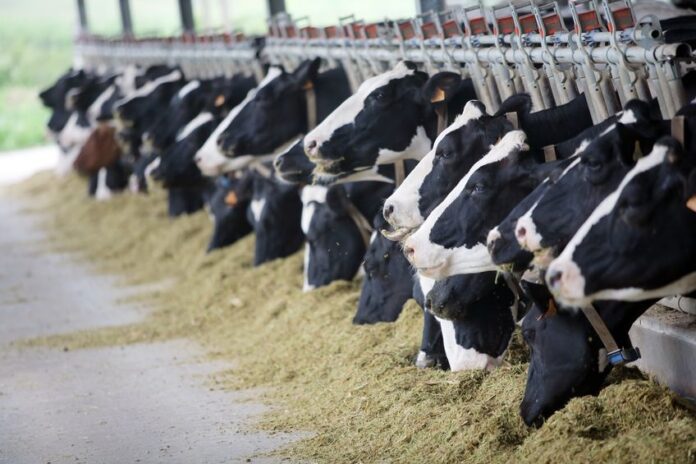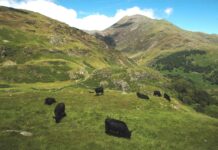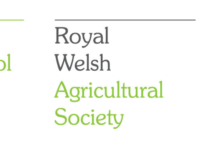 Halving the rate of fertiliser nitrogen (N) applied to grassland through the summer has resulted in a grass yield penalty of just 5% during a trial at a Pembrokeshire dairy farm.
Halving the rate of fertiliser nitrogen (N) applied to grassland through the summer has resulted in a grass yield penalty of just 5% during a trial at a Pembrokeshire dairy farm.
Mountjoy, a Farming Connect demonstration site near Haverfordwest, already uses less N than the upper limit recommended in RB209 but would like to reduce inputs further if possible, to save costs and reduce its environmental impact.
The target is to reduce the whole farm average to 160kgN/ha from past levels of around 230kgN/ha annually.
In well managed grassland, every kilogramme of N applied typically produces around 30kg/DM/ha of grass, a response of 30:1; but N efficiency often diminishes when applied in higher quantities – the grass growth response rate from the first 100kg can be as high as 50: 1 but may halve with the next 100kg applied.
During a recent Farming Connect open day at Mountjoy, the results of the trials were presented to farmers.
In one trial, conducted between July and September 2020, N was applied at a full rate of 18kg on four successive grazing rounds; the grass yield was 5,000kgDM/hectare (ha); at a half rate of 9kg the yield was 4,440kgDM/ha and, on land where no N was applied for those three months, 4,020kgDM/ha of grass grew.
These summer applications showed a response rate of only 13:1 from applied N as the soil organic matter and clover fixation were supplying the sward with most of its N requirement.
In 2021, a zero N treatment was introduced at the start of the year on a section of the trial field, with the rest of the field receiving 94kgN/ha from three applications.
The yield by late July was 5,850kgDM/ha compared to just 3,810kgDM/ha where no fertiliser was applied, giving a response rate of 22:1 from applied N.
The early season check from using no N was far greater than in the summer – particularly during this year’s cold spring.
However, on the no-N treatment, the amount of white clover in the sward has increased, to 23% compared to 13%, so there may be potential to see greater N fixation from the clover and a boost in late season grass growth, says independent grassland specialist Chris Duller, who is overseeing the trial.
He suggested that there were opportunities for every farm to reduce N use, but the trial had also shown its value.
“We need to think about return on investment, N fertiliser is useful stuff if it is used properly,’’ he said.
“Most farmers should be able to reduce their reliance on N fertiliser but soils have got to be healthy, they have to have the correct pH.
“There is a balance to be had and every field is different.’’
The trial has shown that if no N was applied at all, Mountjoy would currently grow around 7tDM a year, driven by clover and soil N mineralisation; this is considerably less than the herd’s requirement.
By applying a whole farm total of 160kg/ha/year of N, the farm can grow another 4tDM/ha, bringing total annual yield to 11tDM/ha.
“The 70kgN/ha we’ve saved wasn’t even growing an extra tonne of dry matter,’’ said Mr Duller.
“Farmers need to be wary about chasing these diminishing marginal yield increases.’’
Mr Duller said soil health, P (phosphate)and K (potash) status, clover content and slurry management all play a role in allowing farmers to grow similar amounts of grass with less N fertiliser inputs.
“Small trials like the one at Mountjoy help give farmers more confidence to step back from using high N rates,’’ he said.
“If we can improve soils and clover even more then N usage could fall further.’’
Farming Connect, which is delivered by Menter a Busnes and Lantra, has received funding through the Welsh Government Rural Communities – Rural Development Programme 2014-2020, which is funded by the European Agricultural Fund for Rural Development and the Welsh Government.
Help keep news FREE for our readers
Supporting your local community newspaper/online news outlet is crucial now more than ever. If you believe in independent journalism, then consider making a valuable contribution by making a one-time or monthly donation. We operate in rural areas where providing unbiased news can be challenging. Read More About Supporting The West Wales Chronicle



























